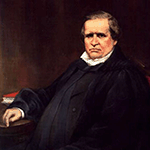
Nathan Clifford (1858-1881)
Nathan Clifford lived between 1803 and 1881. He served as a state attorney general, congressman, United States Attorney General, and an ambassador before becoming an Associate Justice of the Supreme Court in 1858.
Early Life
Clifford was born on August 18, 1803 in the small town of Rumney, New Hampshire. He attended Haverhill Academy and the New Hampton Literary Institute, where he completed his education and announced his determination to study law. Clifford also had a passion for vocal art. He used this musical talent to teach singing lessons after school hours, which supplemented his income.
Legal Career
At the age of eighteen, Clifford began studying law in the offices of Josiah Quincy III. After five years, he was admitted to the practice of law and moved to Newfield, Maine, where he was the only lawyer in town. It was in Newfield where Clifford met and married his wife, Hannah Ayer. Soon after, Clifford was elected into the Maine House of Representatives, where he served from 1830 to 1843. Clifford, a born northern Democrat, became notorious for passionately expressing his opinions during both state and national debates.
President James Polk appointed Clifford as the United States Attorney General in 1846, a position that he held for two years. His tenure as Attorney General ended when, following the war between the United States and Mexico, he was appointed U.S. representative for purposes of establishing a peace treaty between the two nations. Following his service, Clifford returned to practice in Portland, Maine.
Appointment to the Supreme Court
Shortly after Clifford’s return to the United States, he was nominated by President James Buchanan as an Associate Justice of the United States Supreme Court. He was narrowly confirmed by the Senate on January 28, 1858.
Clifford served on the Supreme Court for 23 years without ever addressing a constitutional issue. He delivered over 400 opinions, specializing in commercial and maritime law, Mexican land grants and procedure and practice. Clifford is well known for his supporting role in Hepburn v. Griswold, which declared certain parts of the Legal Tender Act unconstitutional. He was often outvoted by his colleagues, leading him to write many dissenting opinions.
Clifford served on the Supreme Court until July 25, 1881, when he died complications suffered from a major stroke.







